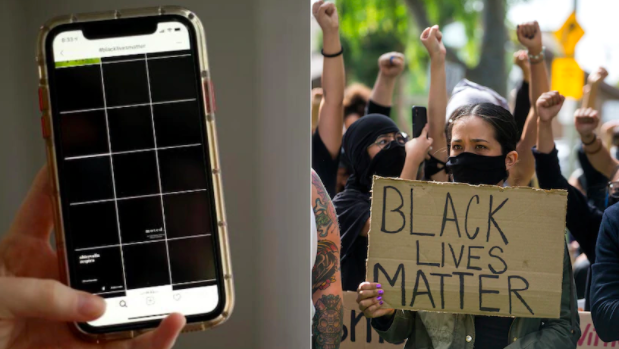Music execs Jamila Thomas and Brianna Agyemang asked their industry to pause business on Tuesday and examine ways to support black communities. Millions joined.
The most influential response to the protests sweeping the nation came from music executives Jamila Thomas and Brianna Agyemang, who called out to their colleagues to pause business as usual across the industry on Tuesday through an Instagram “blackout”, however, the response was everywhere.
Under the name #TheShowMustBePaused, Jamila Thomas and Brianna Agyemang, two black women who work in music marketing, wrote to basically anybody willing to read, stating that in response to the murders of George Floyd, Breonna Taylor, Ahmad Arbery and countless other Black citizens at the hands of the police, they are no longer willing to continue to conduct business as usual without regard for Black lives. It was definitely felt.
The digital protest went worldwide, and was adopted by artists like Yoko Ono and the Rolling Stones, platforms like Spotify and Apple Music, media companies from Nickelodeon, to MTV, Paramount Pictures, and VH1, to Columbia Records, RCA Records, Warner Music Group, Spotify, and artists like Elton John, Madonna, Justin Bieber, Rihanna, Quincy Jones, and other creative communities, like theater, dance, and film. Many others decided to “mute” themselves online Tuesday as part of the blackout, while skeptics worried that silence was not helping. The movement also confused people who used hashtags meant for Black Lives Matter, which usually is related to global protests and donations, on their black squares. That caused the usual #BLM and #BlackLivesMatter pages to be flooded with simple squares rather than information and resources, leading several to call out the problem. Activists and influencers pointed out that posting a blank black image with a bunch of tags clogs up critical channels of information and updates. The Show Must Be Paused released an additional statement clarifying its intent. “The purpose was never to mute ourselves,” the group said. “The purpose is to disrupt.”


Will #BlackOutTuesday disrupt the industry?
Despite that on the Billboard album chart, black artists have held the top spot for 11 out of the last 13 weeks — and occupy four of the Top 5 slots this week, per The New York Times, these calls for action are inevitably intersecting with longstanding issues that critics within the industry have identified as systemic problems, like the lack of diversity among employees and at executive levels, from the major labels to the Recording Academy. Can this social media moment really cause disruption in an industry that has failed to address this issue for years? After the vast reaction online, many are vouching for change, these are some examples.
According to The New York Times reporting by Joe Coscarelli, many in the music business said they would be using the blackout day to plan future action. “This is not a day off,” said Columbia Records, a division of Sony Music, in a social media post. “Instead, this is a day to reflect and figure out ways to move forward in solidarity.” Sony Music said it would expand its mental health support for employees, including grief counseling and a group meditation session this week, as well as promising to match employee donations to social justice organizations. Republic Records said it is “using the time to reflect on the injustices happening to the Black community in America, and discuss how we and our artists can use our voices to impact and create real initiatives for change in our communities.” Universal Music Group said it was forming a task force to address issues such as “inclusion.” For Def Jam, a division of Universal Music, employees joined together and shared their outrage, anger, desperation, and frustration, even announcing they would pause the release, marketing and promotion of their music. Other companies said they would postpone new releases scheduled for Friday, the standard day for debuts.
“Our industry covers every genre of music and is welcoming to new creations,” Jon Platt, the chief executive of the music publisher Sony/ATV, wrote in an open letter on Monday. “I am the only Black CEO of a global major music company. So, to speak out on Mr. Floyd’s senseless murder is my obligation. (…) We must create a platform that provides each and every colleague the encouragement for true self-expression. For people of color, this means the comfort to connect, mourn and heal in authentic ways that might be unfamiliar to, or uncomfortable for, some colleagues. But I encourage you to lean into that discomfort. My dream is for our companies to be an orchestra of races, creeds and colors.”












